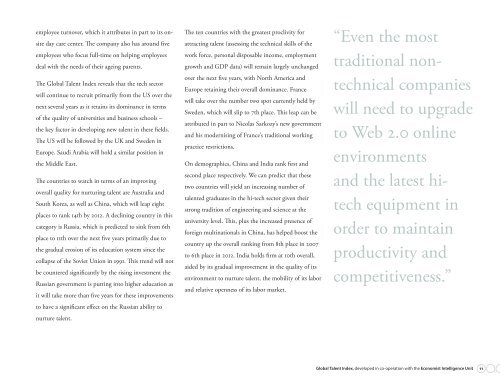Mapping Global Talent: Essays and Insights - Heidrick & Struggles
Mapping Global Talent: Essays and Insights - Heidrick & Struggles
Mapping Global Talent: Essays and Insights - Heidrick & Struggles
Create successful ePaper yourself
Turn your PDF publications into a flip-book with our unique Google optimized e-Paper software.
employee turnover, which it attributes in part to its on-<br />
site day care center. The company also has around five<br />
employees who focus full-time on helping employees<br />
deal with the needs of their ageing parents.<br />
The <strong>Global</strong> <strong>Talent</strong> Index reveals that the tech sector<br />
will continue to recruit primarily from the US over the<br />
next several years as it retains its dominance in terms<br />
of the quality of universities <strong>and</strong> business schools –<br />
the key factor in developing new talent in these fields.<br />
The US will be followed by the UK <strong>and</strong> Sweden in<br />
Europe. Saudi Arabia will hold a similar position in<br />
the Middle East.<br />
The countries to watch in terms of an improving<br />
overall quality for nurturing talent are Australia <strong>and</strong><br />
South Korea, as well as China, which will leap eight<br />
places to rank 14th by 2012. A declining country in this<br />
category is Russia, which is predicted to sink from 6th<br />
place to 11th over the next five years primarily due to<br />
the gradual erosion of its education system since the<br />
collapse of the Soviet Union in 1991. This trend will not<br />
be countered significantly by the rising investment the<br />
Russian government is putting into higher education as<br />
it will take more than five years for these improvements<br />
to have a significant effect on the Russian ability to<br />
nurture talent.<br />
The ten countries with the greatest proclivity for<br />
attracting talent (assessing the technical skills of the<br />
work force, personal disposable income, employment<br />
growth <strong>and</strong> GDP data) will remain largely unchanged<br />
over the next five years, with North America <strong>and</strong><br />
Europe retaining their overall dominance. France<br />
will take over the number two spot currently held by<br />
Sweden, which will slip to 7th place. This leap can be<br />
attributed in part to Nicolas Sarkozy’s new government<br />
<strong>and</strong> his modernising of France’s traditional working<br />
practice restrictions.<br />
On demographics, China <strong>and</strong> India rank first <strong>and</strong><br />
second place respectively. We can predict that these<br />
two countries will yield an increasing number of<br />
talented graduates in the hi-tech sector given their<br />
strong tradition of engineering <strong>and</strong> science at the<br />
university level. This, plus the increased presence of<br />
foreign multinationals in China, has helped boost the<br />
country up the overall ranking from 8th place in 2007<br />
to 6th place in 2012. India holds firm at 10th overall,<br />
aided by its gradual improvement in the quality of its<br />
environment to nurture talent, the mobility of its labor<br />
<strong>and</strong> relative openness of its labor market.<br />
“Even the most<br />
traditional nontechnical<br />
companies<br />
will need to upgrade<br />
to Web 2.0 online<br />
environments<br />
<strong>and</strong> the latest hitech<br />
equipment in<br />
order to maintain<br />
productivity <strong>and</strong><br />
competitiveness.”<br />
<strong>Global</strong> <strong>Talent</strong> Index, developed in co-operation with the Economist Intelligence Unit 11
















